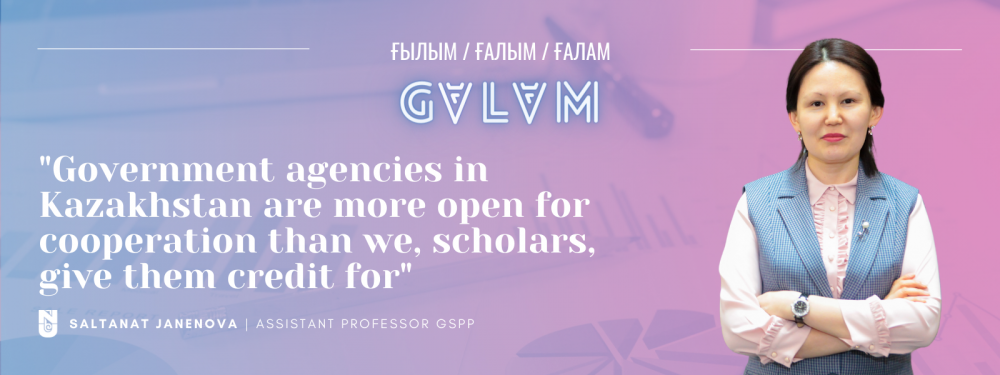“Government agencies in Kazakhstan are more open for cooperation than we, scholars, give them credit for”
Saltanat Janenova is an Assistant Professor at the Graduate School of Public Policy at Nazarbayev University. In 2017 and 2019 she was awarded with the NU Teaching Award in Internationalization and the Scopus award. Saltanat, a two-time Bolashak scholarship fellow, holds an MA in Sociology from Durham University and a PhD in Social Policy from the University of Edinburgh. Prior to Nazarbayev University, Saltanat worked at the Civil Service Agency and Organisation for Economic Cooperation and Development (OECD).
Saltanat, can you please tell us about your research interests?
My research interests include the following topics: civil service reforms in post-Soviet countries, public service innovation, open government, ethics and corruption. In my work, I closely interact with practitioners and government decision-makers.
For example, in my research project on ‘Ethics in Civil Service’ we ran focus groups and interviews with ethics commissioners from various government agencies. Our project was noticed by UNDP colleagues, so they invited us to share the results. And this is how two publications came out: one was an academic article, and the second was a policy report with recommendations.
Then, jointly with my colleague – Professor Colin Knox, we conducted an interesting study on the evaluation of public councils in Kazakhstan. We met with their representatives from different regions, conducted training sessions, published an academic article, and, what is more important, offered some policy recommendations for improving the effectiveness of public councils.
In 2020, my book “A Primer in Policy Communication in Kazakhstan”, was published in collaboration with Basskaran Nair from the National University of Singapore. In this book, we described examples of media and social network use in international and Kazakhstani contexts, explained how ‘soft power’ can be applied, analyzed the reasons for reforms failures, and offered recommendations for policy-makers and experts. This book is available in three languages: Kazakh, Russian, and English.
Astana Сivil Service Hub, a joint UNDP and the Government of the Republic of Kazakhstan project, initiated the creation of case studies on the implementation of the one-stop-shops for public services delivery in Azerbaijan, Georgia, and Kazakhstan (I wrote a case study on Kazakhstan). These case studies were widely discussed among civil servants and experts in the CIS countries. Recently we published a joint publication with the Chairman of the Hub Alikhan Baimenov in the book entitled “Public Service Excellence in the 21st century”, where we discuss civil service reforms in post-Soviet countries.
Undoubtedly, collaboration with government agencies requires a lot of time, efforts and patience. However, if this collaboration of research and practice eventually influences decision-making, I believe that the work of a scholar should be acknowledged and recognized. In the Western academic world, such contributions are called “impact research”.
You recently received an award from the British Council. Can you please elaborate on this?
The British Council awarded me with the Professional Achievement Award in March 2021. The British Council annually organizes this contest among alumni from UK universities worldwide. Education in the UK has changed my career path, shifting it from civil service to teaching and research.
In 2020, I immersed myself into the British academic world: I was teaching graduate students at the University of Birmingham’s School of Government. This university is one of the prestigious Russell Group Universities. It was a very rewarding teaching experience: lecturing students from different continents and countries. British scholars inspire me. In addition to high teaching load, writing publications, and receiving grants, UK researchers manage to actively advocate the results of their studies among government agencies, NGOs, and international organizations.
What are your plans for the nearest future?
I plan to conduct comparative research on public administration reforms, apply for international grants, and publish in reputable peer-reviewed journals. I hope that with my work I make a modest contribution to the promotion of Nazarbayev University as a recognizable brand of higher education in Kazakhstan and Central Asia.


